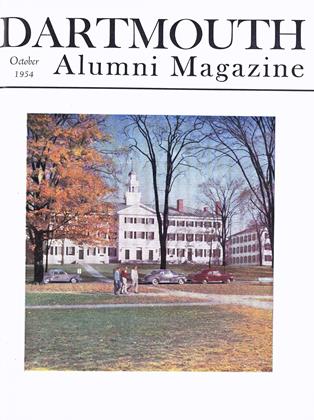ByGeorge W. Elderkin 02. New York: VantagePress, 1954. 267 pp. $3.00.
Professor Elderkin taught and wrote upon Greek Art and Archaeology at Princeton from 1910 until 1948. His concern with Roman Catholicism seems to be a subsequent development, perhaps inspired by Paul Blanchard, whom he cites with approval. Elderkin believes that the three present major threats to democracy are (1) Russia; (2) Germany, the western portion of which has really become a Catholic state; and (3) the Vatican, "which is traditionally hostile to popular rule, and freedom of thought and belief."
Instances of Roman Catholic intolerance are recounted at length, mostly occurrences of our own time. An oath of the Knights of Columbus in the United States pledges its members to "make and wage relentless war secretly and openly, against all heretics, Protestants and Masons ... to extirpate them from the face of the whole earth" (p. 46).
This book is not entirely a diatribe against the Roman Catholic Church. Chapter IV contains an account of the probable indebtedness of Christianity to the interesting but little understood religion of Mithra. "It is the relationship of Christianity to Greek and Roman paganism that explains the former's rapid conquest of the West, as compared with its inability to penetrate to the East" (p. 78).
Roman Catholics claim that the laws of their Church transcend the laws of the state, and the hierarchy hopes to dominate the government of the United States whenever Catholic citizens shall be in the majority. They endeavored to prevent the United States from intervening in both the First and the Second World Wars, in order to assure German victories. They often dominate American public schools, municipal and national governments, and the Democratic party. The Jesuits have much influence in the F.B.I.
The present Catholic program is to involve the United States and European nations in war against Communism and Orthodox Russia. This proved successful, the Church will next seek to realize her final ambition of overwhelming England and the United States with the martial help of Adenauer's Catholic Germany re-enforced by Italy, Spain, and South America (p. 257).
I beg to assure readers that the views summarized above are exclusively Professor Elderkin's—by no means my own.
 View Full Issue
View Full Issue
More From This Issue
-
 Feature
Feature"The Working of the Religious Element"
October 1954 By GEORGE H. COLTON '35 -
 Feature
Feature"The Individual and the College"
October 1954 By FRANK PEMBERTON -
 Feature
FeatureNew Faculty Faces
October 1954 -
 Feature
FeatureLiveliest Point of the Summer
October 1954 -
 Feature
FeatureTHIRTEEN IS LUCKY
October 1954 -
 Class Notes
Class Notes1918
October 1954 By ERNEST H. FARLEY, W. CURTIS GLOVER, RICHARD P. WHITE
WILLIAM KELLEY WRIGHT
-
 Books
BooksTHE QUEST FOR CERTAINTY
MARCH 1930 By William Kelley Wright -
 Books
BooksTHREE BOOKS ON RELIGION. RELIGION
APRIL 1930 By William Kelley Wright -
 Books
BooksTHE PROBLEM OF HISTORICAL KNOWLEDGE.
January 1939 By William Kelley Wright -
 Books
BooksRATIONAL BELIEF: AN INTRODUCTION TO LOGIC
May 1941 By William Kelley Wright
Books
-
 Books
BooksFaculty Publications
December 1948 -
 Books
Booksshelflife
May/June 2011 -
 Books
BooksEDITOR'S PICKS
NOVEMBER | DECEMBER 2013 -
 Books
BooksSOVIET CRIMINAL LAW AND PROCEDURE: THE RSFSR CODES.
MAY 1966 By CHARLES B. MCLANE '41 -
 Books
BooksFACULTY PUBLICATIONS
By P.O. SKINNER -
 Books
BooksMINNESOTA AND THE MANIFEST DESTINY OF THE CANADIAN NORTHWEST.
APRIL 1966 By RICHARD W. STERLING

